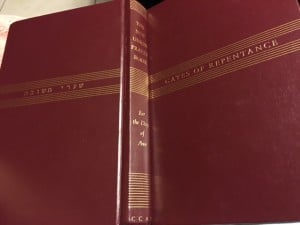“From Moses [of the Torah]
to Moses [Maimonides]
there was none like Moses.”
Who was Maimonides?
“If one did not know that Maimonides was the name of a man, Abraham Joshua Heschel wrote, one would assume it was the name of a university. The writings and achievements of this twelfthcentury Jewish sage seem to cover an impossibly large number of activities. Maimonides was the first person to write a systematic code of all Jewish law, the Mishneh Torah; he produced one of the great philosophic statements of Judaism, TheGuide to the Perplexed; published a commentary on the entire Mishna; served as physician to the sultan of Egypt; wrote numerous books on medicine; and, in his “spare time,” served as leader of Cairo’s Jewish community.
More about Maimonides in :
http://www.jewishvirtuallibrary.org/jsource/biography/Maimonides.html
~~~~~~~~~~~~~~~~~~~~~
Free will is given to every human being. If we wish to incline ourselves toward goodness and righteousness, we are free to do so; and if we wish to include ourselves toward evil, we are also free to do that. From Scripture (Genesis 3:22) we learn that the human species, with its knowledge of good and evil, is unique among all earth’s creatures. Of our own accord, by our own faculty of intelligence and understanding, we can distinguish between good and evil, doing as we choose. Nothing holds us back from making this choice between good and evil—the power is in our hands.
~~~~~~~~~~~~~~~~~~
Do not imagine that character is determined at birth. We have been given free will. Any person can become as righteous as Moses or as wicked as Jeroboam. We ourselves must decide whether to make ourselves learned or ignorant, compassionate or cruel, generous or miserly. No one forces us, no one decides for us, no one drags us along one path or the other; we ourselves, by our own volition, choose our own way.
~~~~~~~~~~~~~~~~~~
In connection with the Mitzvah of following the right path, it has been taught: As God is called gracious, so must you be gracious; as God is compassionate, so must you be; as God is holy, so must you follow the path of holiness. Therefore the prophets described God as possessing these attributes: endlessly patient and loving, just and upright, wholehearted, and the like. Their intention was to teach us that these are the good and praiseworthy paths for us to follow as we attempt, according to our capacities, to imitate God.
~~~~~~~~~~~~~~~~~~
With regard to all human traits, the middle of the road is the right path. For example: Do not be hot-tempered, easily angered. Nor, on the other hand, should you be unfeeling like a corpse. Rather, take the middle of the road: keep an even disposition, reserving your anger for occasions when it is truly warranted. Similarly, do not cultivate a desire for luxuries; keep your eye fixed only on genuine necessities. In giving to others, do not hold back what you can afford, but do not give so lavishly that you yourself will be impoverished. Avoid both hysterical gaiety and somber dejection, and instead be calmly joyful always, showing a cheerful countenance. Act similarly with regard to all the dispositions. This is the path followed by the wise.
~~~~~~~~~~~~~~~~~~~
How do we fix these traits into our character? By repeatedly doing them, returning to them until they become second nature. And because these attributes are divine, this path, the one that avoids extremes, is called the ‘path of God,’ and Abraham taught his descendants to follow it. Whoever follows it gains goodness and blessing, as it is said:
“For I have known him, that he might command his children and those who follow him to keep the Lord’s path, doing justice and right, that the Lord may fulfill for Abraham the divine purpose (Genesis 18:19).
~~~~~~~~~~~~~~~~~~~~~~
Smooth speech and deceptions are forbidden us. Our words must not differ from our thoughts; the inner and outer person must be the same; what is in the heart should be on the lips. We are forbidden to deceive anyone, Jew or Gentile, even in seemingly small matters. For example, one must not urge food on another, knowing that the other cannot eat it; one must not offer gifts that cannot be accepted; a storekeeper opening a bottle in order to sell its contents must not pretend to be opening it in honor of a particular person, and the like. Honest speech, integrity, and a pure heart–that is what is required of us.
~~~~~~~~~~~~~~~~~~~~~~~
If you see a friend sinning or pursuing an unworthy life, it is a Mitzvah to try to restore that person to the right path. Let your friend know that wrong actions are self-inflicted hurts, but speak softly and gently, making it clear that you speak only because of your concern for your friend’s well-being.
~~~~~~~~~~~~~~~~~~~~
Our sages taught: One who shames another in public has no share in the world-to-come. Therefore one must take great care not to shame another in public, whether young or old, either by shameful name-calling or tale-bearing.
~~~~~~~~~~~~~~~~~~~~
Every human being has merits and faults. The righteous person has more merits than faults, the wicked one more faults than merits. The average person is (more or less) evenly balanced between the two. A community, too, is judged in this matter: if the merits of its citizens outweigh their faults, it is called righteous: if their faults outweigh their merits, it is called wicked.
~~~~~~~~~~~~~~~~~~~~
Do not think you are obliged to repent only for transgressions involving acts, such as stealing, robbing, and sexual immorality. Just as we must repent such acts, so must we examine our evil feelings and repent our anger, our jealousy, our mocking thoughts, our excessive ambition and greed. We must repent all these. Therefore it is written:
“Let the wicked forsake their ways, the unrighteous their thoughts” (Isaiah 55:7)
~~~~~~~~~~~~~~~~~~~~
The source of these quotes? A second hand book I picked up from the Burlingame (CA) Public Library which cost me a measly $2, one of my unexpected treasure finds:
GATES OF REPENTANCE: The New Union Prayer Book for the Days of Awe, a publication resulting from the CENTRAL CONFERENCE OF AMERICAN RABBIS, NY 1978 [5738], Revised 1996.




